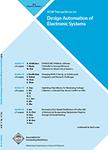版权所有:内蒙古大学图书馆 技术提供:维普资讯• 智图
内蒙古自治区呼和浩特市赛罕区大学西街235号 邮编: 010021

作者机构:Indian Inst Technol Kharagpur Comp Sci & Engn Kharagpur West Bengal India Indian Inst Technol Kharagpur Elect Engn Kharagpur West Bengal India Indian Inst Technol Kharagpur Electron & Commun Engn Kharagpur West Bengal India
出 版 物:《ACM TRANSACTIONS ON DESIGN AUTOMATION OF ELECTRONIC SYSTEMS》 (ACM Trans. Design Autom. Electron. Syst.)
年 卷 期:2025年第30卷第2期
页 面:1-32页
核心收录:
学科分类:08[工学] 0835[工学-软件工程] 0812[工学-计算机科学与技术(可授工学、理学学位)]
主 题:Computer systems organization-Real-time systems Parallel architectures Hardware-Thermal issues Q-Learning adaptive thermal management heterogeneous computing gaussian process regression reinforcement learning
摘 要:With increasing transistor density, modern heterogeneous embedded processors often exhibit high temperature gradients due to complex application scheduling scenarios which may have missed design considerations. In many use cases, off-chip active cooling solutions are considered prohibitive in such reduced form factors. Core frequency throttling by existing dynamic thermal management techniques often compromises the Quality-of-Service (QoS) and violates real-time deadlines. This necessitates the adoption of intelligent resource management that simultaneously manages both thermal and latency performance. Coupled with the complexity of modern heterogeneous multi-cores, the periodic application updates that cater to everchanging user requirements often render model-driven thermal-aware resource allocation approaches unsuitable for heterogeneous multi-core systems. For such application-architecture scenarios, we propose a novel self-learning based resource manager using Reinforcement Learning that intelligently manipulates core frequencies and task set mappings to fulfill thermal and latency objectives. Our framework employs a datadriven system modeling technique using Gaussian Process Regression to enable efficient offline training of this learning-based resource manager to avoid challenges associated with initial online training. We evaluate the approach on a heterogeneous embedded CPU-GPU platform with real workloads and observe a significant reduction in peak operating temperature when compared to the default onboard frequency governor as well as other learning-based state-of-the-art approaches.